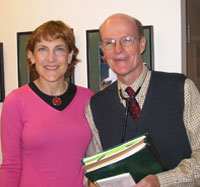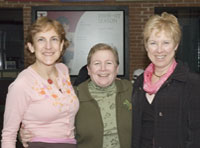John Fetting, III, M.D., Associate Director for Clinical Oncology of the Johns Hopkins Sidney Kimmel Cancer Center.
Lillie Shockney and Deb Stewart. Lillie is the Administrative Director and Deb is an RN/Breast Educator at the Johns Hopkins Avon Breast Center. |
research projects and challenge grantsWhat research projects can a small foundation support? When I met with my surgeon the first time, I was offered the option of breast preservation. This experience was in marked contrast to a similar meeting that might have occurred had I been diagnosed in the 1960’s when options for people undergoing cancer treatment were limited. The advances in medicine and the expansion of options for people undergoing treatment result from the participation by cancer patients in research studies in the 70’s and 80’s. I was able to keep the majority of my lymph nodes because patients participated in even more recent research for sentinel lymph node biopsy in the 90’s and early 2000. Research studies are ongoing that are aimed at improving not only survival from cancer but also improving quality of life. In the area of breast cancer, studies are underway to find less invasive treatment methods, such as those that deliver chemotherapy directly to tumors through the breast ducts, killing the tumor cells in the breast without surgery, and needle biopsies of lymph nodes instead of surgical biopsies. Another project is aimed at the expansion of thorough medical histories and counseling of genetic conditions that may cause cancer, including the group of genetic defects that have been found to cause cancer in certain ethnic groups such as Jewish people of Eastern European descent. Rather than having extensive analysis of family medical histories during or after treatment of one family member’s cancer, an earlier coordination of medical intervention might change the course or selection of treatment and reduce the possibility of other family members unknowingly having the same cancer in the future. The primary focus of these studies is to reduce the pain, disfigurement, and anxiety associated with diagnosis and treatment. Research is also underway to study the long-term effects of treatment and then to try to determine ways to reduce those long-term effects. <We may not be a large foundation, but with well placed funds and targeted research projects, we can help make a difference. challenge grantsWe are leveraging our limited resources to make an impact by making challenge grants to other foundations that support cancer survivors and their loved ones. Our first challenge grant was to an organization called The Red Devils that offers meal preparation, transportation, housekeeping and other services to Maryland families with a member receiving medical treatment for breast cancer. We funded a grant to pay for prescription drugs for women who are uninsured, under-insured or for whom deductibles on their insurance policies made the purchase of medicine difficult, if not impossible. By showing the overwhelmingly positive results of our challenge grant, this grant enabled The Red Devils to obtain much larger grants to broaden the scope of this program. We are actively considering other projects that we could fund with challenge grants. We think large even if we are a small foundation. And we are smart with our investments. That is what we mean by “Thinking Brighter.” < |

